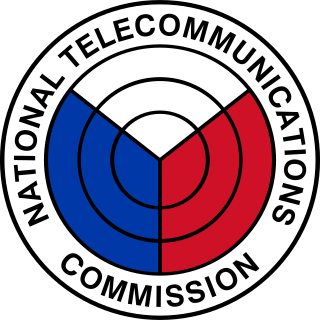Telecommunications in the Philippines are well-developed due to the presence of modern infrastructure facilities. The industry was deregulated in 1995 when President Fidel Ramos signed Republic Act 7925. This law opened the sector to more private players and improved the provision of telecom services are better and fairer rates, leading to the creation of many telecommunication service providers for mobile, fixed-line, Internet and other services.

The Communications Act of 1934 is a United States federal law signed by President Franklin D. Roosevelt on June 19, 1934 and codified as Chapter 5 of Title 47 of the United States Code, 47 U.S.C. § 151 et seq. The Act replaced the Federal Radio Commission with the Federal Communications Commission (FCC). It also transferred regulation of interstate telephone services from the Interstate Commerce Commission to the FCC.

The telecommunications policy of the United States is a framework of law directed by government and the regulatory commissions, most notably the Federal Communications Commission (FCC). Two landmark acts prevail today, the Communications Act of 1934 and the Telecommunications Act of 1996. The latter was intended to revise the first act and specifically to foster competition in the telecommunications industry.
Innovation, Science and Economic Development Canada is a department of the Government of Canada. ISED is responsible for a number of the federal government's functions in regulating industry and commerce, promoting science and innovation, and supporting economic development. The department was known as Industry Canada (IC) prior to 2015.

The Directorate-General for Communications Networks, Content and Technology is a Directorate-General of the European Commission and is responsible for EU investment in research, innovation and development of critical digital technologies.

The Independent Communications Authority of South Africa (ICASA) is an independent regulatory body of the South African government, established in 2000 by the ICASA Act to regulate both the telecommunications and broadcasting sectors in the public interest.
The telecommunications industry in China is dominated by three state-run businesses: China Telecom, China Unicom and China Mobile. The three companies were formed by restructuring launched in May 2008, directed by the Ministry of Information Industry (MII), National Development and Reform Commission (NDRC) and the Minister of Finance. Since then, all three companies gained nationwide fixed-line and cellular mobile telecom licenses in China. In 2019, all three telecoms were issued 5G national licenses.

The Malaysian Communications and Multimedia Commission is a regulatory body whose key role is the regulation of the communications and multimedia industry based on the powers provided for in the Malaysian Communications and Multimedia Commission Act 1998, the Communications and Multimedia Act 1998, and the Strategic Trade Act 2010. MCMC is similar to the National Telecommunications Commission (NTC) in the Philippines. Its role to implement and promote the Government's national policy objectives for the communications and multimedia sector. MCMC is also charged with overseeing the new regulatory framework for the converging telecommunications and broadcasting industries and online activities. In 2001, MCMC's role was expanded to include overseeing the postal service sector pursuant to the Postal Services Act 1991 and licensing of the Certification Authorities under the Digital Signature Act 1997.
The Communications and Information Technology Commission is the Saudi communications authority. It was first established under the name of Saudi Communications Commission in accordance with the decision of the Council of Ministers. The name was changed after the commission was assigned new tasks related to information technology. Since October 2006, CITC has been handling the DNS structure and filtering in Saudi Arabia in the place of KACST.

The National Telecommunications Commission is an attached agency of the Department of Information and Communications Technology responsible for the supervision, adjudication and control over all telecommunications services and television and radio networks throughout the Philippines.
After President Nixon took office in 1969, Clay T. Whitehead, Special Assistant to the President, pushed to establish an executive office dedicated to telecommunications policy. The White House Office of Telecommunications Policy (OTP) was established in 1970. In 1978, it was merged, along with the Commerce Department's Office of Telecommunications, into the newly created National Telecommunications and Information Administration (NTIA).
The Communications Authority of Kenya (CA) is the regulatory authority for the ICT industry in Kenya with responsibilities in telecommunications, e-commerce, broadcasting and postal/courier services. The CA is also responsible for managing the country's numbering and frequency spectrum resources, administering the Universal Service Fund (USF) as well as safeguarding the interests of users of ICT services.
Botswana Telecommunications Authority (BTA) is a dissolved independent commission that was responsible for regulating all matters related to telecommunications, postal services of Botswana and has been succeeded by Botswana Communications Regulatory Authority. The Minister appoints all five board members, who serve on a part-time basis. The BTA is mandated to promote the development and provision of efficient telecommunications and broadcasting services in Botswana, under the terms of the Telecommunications Act 15 of 1996. There have been legal disputes between the BTA and licensed operators, springing from issues related to interconnection and pricing.

The Information and Communication Technologies Authority (ICTA), is a national telecommunications regulatory and inspection authority of Turkey. It was formerly known as the Telecommunications Authority.

The Egyptian Ministry of Communications and Information Technology (MCIT) is a government body headquartered in Smart Village Egypt, Giza Governorate, in the Cairo metropolitan area. Established in 1999, the Ministry is responsible for information and communications technology (ICT) issues in the Arab Republic of Egypt including the planning, implementation and operation of government ICT plans and strategies. It is led by the Minister of Communications and Information Technology, who is nominated by the Prime Minister and is a member of the cabinet. The current ICT Minister is Amr Talaat who assumed the position on 14 June 2018.
Communications law refers to the regulation of electronic communications by wire or radio. It encompasses regulations governing broadcasting, telephone and telecommunications service, cable television, satellite communications, wireless telecommunications, and the Internet.

The Ministry of Communication and Technology is the government ministry responsible for the development of communication and technology in Ghana. Its mission is to pursue policies that will lead to the cost-effective creation of information and communications infrastructure and services in order to promote economic competitiveness in line with the policy guidelines of the Medium Term National Development Policy Framework (MTNDPF) developed as the basis of the Ghana Shared Growth and Development Agenda (GSGDA). The ministry's offices are located in Accra, Greater Accra.

Progresif Sdn Bhd. is a Brunei-based Government Linked Company headquartered in Bandar Seri Begawan, Brunei. Founded in 2014, Progresif now has more than 130 employees and around 200,000 customers, with eight retail stores throughout the kingdom.

Datastream Digital Sdn Bhd. (DST) formerly DataStream Technology Sdn Bhd is a Brunei-based Government Linked conglomerate headquartered in the DST Group Building in Bandar Seri Begawan, Brunei. It was established in 1995 and as of December 2021 has at least 420,000 subscribers.












